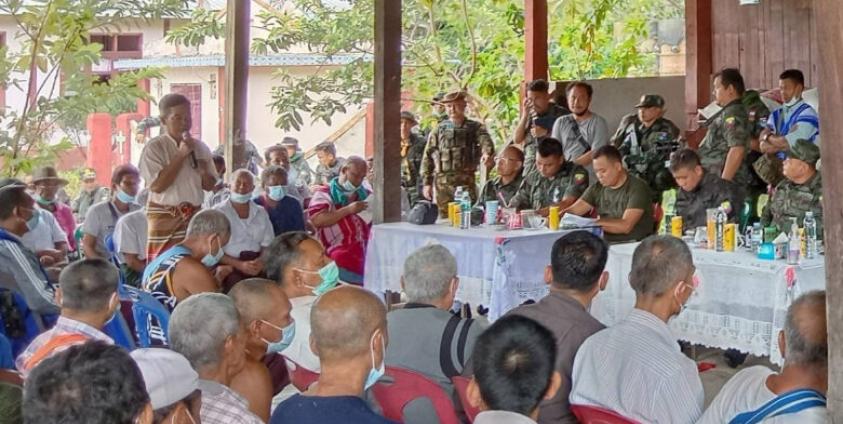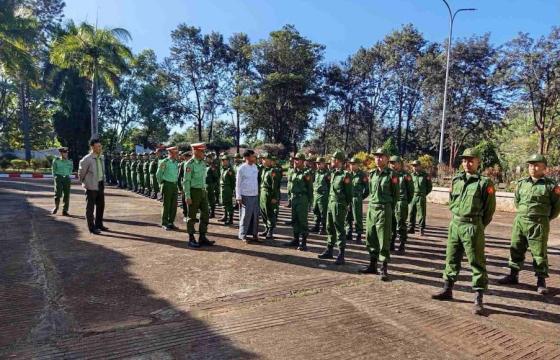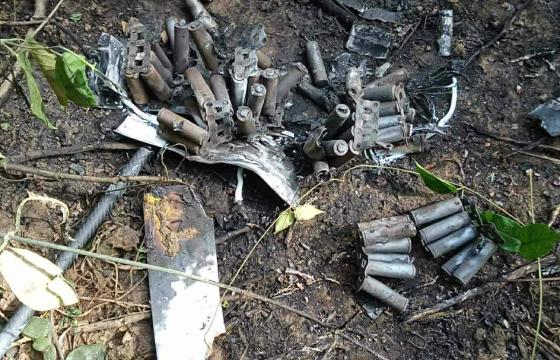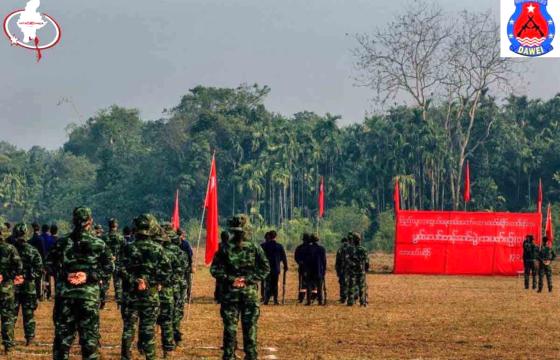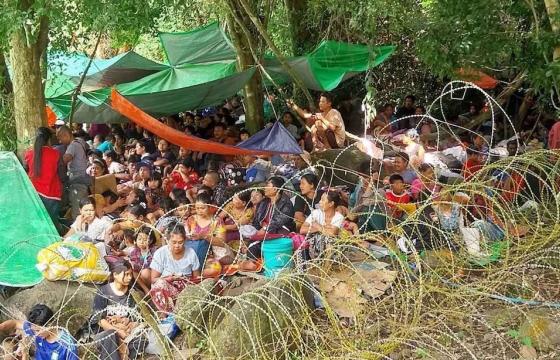General Saw Steel, Commander-in-Chief of the Democratic Karen Buddhist Army (DKBA), claimed while speaking at a meeting in Palu Gyi village that opponents of the military junta and fighting in the Lay Kay Kaw area were financed by foreign countries.
The meeting held at the Palu Gyi village temple on June 5th was attended by troops funded by the military-appointed State Administration Council and included the Border Guard Force militia, sponsored and under the control of the Burma Army, DKBA soldiers and local villagers.
General Saw Steel alleged at the meeting the Junta’s opponents were using the war as a means to make money.
“In the past, we have seen people who earn their living by corn-harvesting, transporting consumer goods and farming. Now, some people earn their living from fighting wars.
They [junta’s opponents] would not have anything to eat if they didn’t fight in a war. They don’t have money. When they fight in wars, people in other countries send money. Then they survive on that. They are not fighting for the country. They are earning a living by fighting.”
Contrary to General Saw Steel’s allegation the United Nation’s agency for refugees estimated “the number of IDPs people since the 2021 military takeover [1st February 2021 coup] now exceeds 694,300, bringing the overall number of displaced people across the country to more than one million.”
The UN reports since the coup; “More than 12,700 civilian properties, including houses, churches, monasteries, and schools are estimated to have been destroyed.”
General Saw Steel told the meeting the current conflict must be resolved between the Karen National Union (KNU) and the DKBA could not get involved.
General Saw Steel said the current fighting is being carried out by non-locals and falsely claimed the DKBA and BGF were the only ones protecting the people.
In response to General Saw Steel comments, Brigadier General Saw Ner Dah Bo Mya of the Karen National Defense Army (KNDO), who is currently fighting against the military-appointed State Administration Council’s troops in the southern Myawaddy, said that he did not want to comment on the DKBA’s statement as it is the time of the conflict but he would continue to monitor the situation.
General Ner Dah pointed out the DKBA had a much documented history of working with the Burma Army. “I don’t want to say much as they [DKBA] are working with the Burmese [military]. We will monitor the situation. No matter what they say, the local [villagers] know they [DKBA] are working for the Burmese [military].”
In a bizarre comment General Saw Steel claimed the DKBA and BGF were the ones helping IDPs and accused community-based-organizations of doing little, except helping themselves.
“Nobody knows the DKBA is helping. Nobody knows the BGF is helping. People only know about the foreign aid. [Colonel] Chit Thu and I never have good names. The migrants in foreign countries, who are attacking us, will not come back to feed us. After all, they are selling you out. If they get 1000 dollars, they will pocket 500 dollars, and only 500 dollars will get to you.”
Naw K’Nyaw Paw, secretary of the Karen Women’s Organizations (KWO) assisting the displaced people said General Steele’s allegations clearly showed the DKBA did not understand how the humanitarian process worked and were making false allegations because they were working with the coup leaders and its military-appointed State Administration Council.
Naw K’Nyaw Paw told Karen News, “They (DKBA) have never done anything related to getting help. Because they have never done it (providing help), they probably do not understand that there is a code-of-conduct that needs to be followed when delivering emergency aid. They [DKBA] are attacking these [aid] organizations because they are working with the military.”
Both the DKBA and the Border Guard Force have a well-documented history of human rights violations, land confiscations that has resulted in thousands of Karen villagers being displaced.
A 2016 report by Karen Human Rights Group documented that “Recent fighting between newly-reformed DKBA and joint forces of BGF and Tatmadaw soldiers led more than six thousand Karen villagers to flee in Hpa-an District, September 2016.”
In November, 2016, a Human Rights report on land confiscation stated; “The threat of violence by BGFs and other armed groups remains a reality in Karen State, which may explain why many farmers are reluctant to protest against the taking of their land when armed groups are involved.
During the Palu Gyi Temple public meeting, DKBA commander in chief General Steel questioned why some people who were able to return to their homes continued to stay in the displaced camps, adding the good food they were receiving might be a factor.
A local resident, (who spoke on the condition of anonymity), ridiculed General Steel’s reasoning; “Why would the displaced do that? Think about it. People are hiding on the riverbanks because they [the armed groups] are not united. They do not understand how the people have been surviving. The people are paying taxes to feed them [DKBA] and in return they are not protecting the people.’
Palu residents said they were requested at the meeting to return to their homes, resume planting crops again and work on sending the children back to school.
Villagers said there was no discussion about who would be held accountable or who would take responsibility for the displaced villager’s livelihood, village community safety, and safety from landmine danger.
Villagers said if the armed groups wanted them to return to their homes, it would only be possible if all the soldiers stationed in their village withdrew.
The meeting was attended by 100 local villagers, the BGF’s General Secretary Colonel Saw Chit Thu and his troops, DKBA Commander-in-Chief General Saw Steel and his soldiers, and the Burma Army – a combined force of 300.
A Tactical Commander from the military-appointed State Administration Council who attended the meeting said local people could return home and promised the military council would not launch an offensive.
The Commander said, “I believe it is possible for people to return to Palu Lay, Palu Gyi, Min Latt Pan, Ingyin Myaing, Mae Htaw Thalay, and Per He Klaw. We, the Tatmadaw, will not launch any offensive. We will not start an attack. We are not attacking the whole (Karen National Union) organization. We are not using excessive forces.”
The Tactical Commander said local villagers could return to their homes and nearby Tatmadaw camps would be informed of it and people could resume farming.
Villagers told Karen News the Burma Army Tactical Commander words held little truth and it was the Burma Army and its militia, the BGF who were the cause of the displacement.
A view supported by an Amnesty international report that stated; “On 9 June [2021], the UN Special Rapporteur on the situation of human rights in Myanmar Tom Andrews warned of “mass deaths from starvation, disease and exposure” across the state as the military cut off displaced people’s access to food, water and medicine, including by blocking aid deliveries.”
In Mae Htaw Thalay, Min Latt Pan, Ingyin Myaing, Htee Mae Wah Khee, Per He Klaw, Palu Gyi, Palu Lay, and Yathit Gu in South of Myawaddy, the clashes between the military council and the KNLA forces has been going on for more than six months.
According to aid workers, more than 15,000 displaced people living in groups from Lay Kaw Kaw, Kyout Khat, Lay Daw, Walle, Kanae Lay, Ta Eu Hta, Ta Naw Hta, Thay Baw Boe, Kalaw Htaw, and Sukali have not yet been able to return home and as the monsoon rains come are in urgent need of shelter, food, medicine and safe drinking water.


